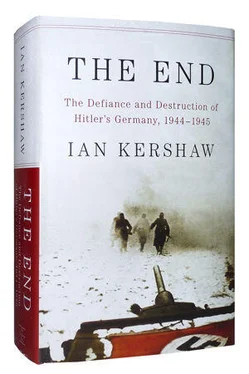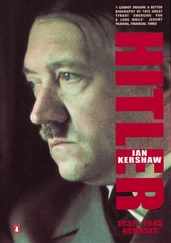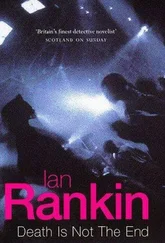Military power, too, had been consolidated in the hands of loyalists. As fortunes on the battlefield worsened, the military leadership had bound itself to Hitler more tightly than ever. In the process, it had cut off any possibility of extricating itself from those bonds. It had committed itself to the very dualism that Hitler himself embodied: victory or downfall. Since victory was increasingly out of the question, and Hitler invariably and repeatedly ruled out any attempt at a negotiated settlement, that left downfall. Possibilities had changed. There was now no exit route.
From the comfortable distance of imprisonment just outside London, the recently captured Luftwaffe officer Lieutenant Freiherr von Richthofen said in early August in a conversation secretly bugged by British intelligence that he was glad the assassination attempt on Hitler had failed. If it had succeeded, he claimed, there would have been a ‘stab-in-the-back’ legend such as had bedevilled German politics after 1918. This time, he added, it was politically necessary for the nation to go down the road to the bitter end. 117This assessment was to leave out of the equation the millions of lives that would have been saved had the bomb plot succeeded and the war been rapidly ended. But it was surely correct in its assumption that a new ‘stab-in-the-back’ legend would have arisen, posing a threat to any post-Hitler settlement. And it was undoubtedly correct in its assumption that the failure of the attempt to topple Hitler from within in July 1944 meant that the regime could from now on be overthrown only by total military defeat. Just how the regime might sustain its war effort until that point—as it turned out, still over eight months away—was a question, however, that Richthofen did not pose.
We want to build a new Europe, we, the young people facing the old! But what are we? Famished, exhausted, and drained by madmen. Poor and tired, worn out and nerve-ridden. No, no, no! It’s not on any more.
An officer on the western front, September 1944
‘Victory must be ours…. One does one’s duty and it would be cowardice not to fight to the end.’ ‘We don’t give up hope. It is all up to the leaders. Something quite different will happen from what everybody expects.’ ‘If we don’t win, Germany ceases. Therefore we shall win.’
Views of captured German soldiers on the western front, September 1944
At the time of the attempted uprising on 20 July, the progress of the American and British armies in Normandy had, from an Allied viewpoint, remained disappointingly slow and arduous. They had still not broken out of a relatively constricted area of north-western France. From the German perspective, it still looked in mid-July as if the Allies could be held at bay. By winning time, new possibilities could open up. All was far from lost.
The landing in early June had by now been fully consolidated. The Americans had pushed westwards that month to take the important port of Cherbourg, but it had taken twenty-three, not the expected fifteen, days and they found the harbour so wrecked that it was six weeks before it could be opened up to Allied cargoes. The city of Caen had been a D-Day objective but its environs were fully secured by the Allies, in the teeth of fierce German resistance, only in mid-July. Then as the British pushed southwards towards Falaise, they became embroiled in further heavy fighting before their advance in the ill-fated ‘Operation Goodwood’ was called off, amid torrential rain and heavy losses of men and tanks, on the very day that Stauffenberg’s bomb had exploded in Hitler’s headquarters. Five days later, the big offensive ‘Operation Cobra’, starting with a huge carpet-bombing assault on German lines, aimed at a strong thrust by American troops to punch through numerically inferior German defences, further pulverized from the air, south-westwards to Avranches, near the French coast. By 30 July the offensive had succeeded. Late that night Avranches was in Allied hands. 1A major breakthrough was now possible. The road westward to the coastal ports of Brittany lay exposed (though it was to be weeks before stiff German resistance was overcome and the ports captured). To the south lay the Loire. Eastwards, towards Paris itself, only weakened German forces now stood in the way of the Allies.
Hitler’s thinking so far had been to play for time. He had reckoned that further dogged German resistance would ensure that the Allies continued to make only slow progress. His priority in the west was to hold the U-boat bases on the French coast, essential for the war in the Atlantic on which so much still hinged, in his view, and fanatical defence of the harbours to deny the Allies the possibility of large-scale troop reinforcements. Containing the Allies in north-western France and gaining time would allow defences to be strengthened and preparations made for a major German offensive, an idea already germinating in Hitler’s mind. Inflicting a defeat on the western Allies and halting their presumed march to victory would then force them into armistice negotiations. 2
He was now faced, however, with the implications of the Allied capture of Avranches. It was an ominous development. Characteristically, he chose not to respond by withdrawing German troops to new lines to the east. Instead, he commissioned Field-Marshal Hans Günther von Kluge—whose idea it had originally been—to launch a quick counter-offensive westwards through Mortain, aimed at retaking Avranches, splitting the American forces and re-establishing the German lines. Kluge’s attack took place in the early hours of 7 August, but was effectively over after a single day. German troops did succeed in regaining Mortain and advancing about 11 kilometres. But, subjected to ceaseless bombardment, they could get no further. By insisting on Kluge continuing the attack long after wisdom dictated swift withdrawal, Hitler invited disaster. Since Kluge faced increasing danger of encirclement by American forces, Hitler eventually allowed a retreat from the Mortain area on 11 August, but as late as 15 August refused Kluge’s entreaty to withdraw 100,000 troops in great peril near Falaise.
Hitler’s suspicions of his field-marshal boiled over when he could not reach him by radio that day, and he peremptorily dismissed him from his command, replacing him by the trusted troubleshooter, the tough and unyielding Field-Marshal Model. Soon afterwards, correctly fearful that he would be put on trial before the dreaded People’s Court for his connection with the conspiracy against Hitler (even though he had been careful not to join the plot), Kluge committed suicide. Model eventually extricated around 50,000 men from the rapidly tightening ‘Falaise pocket’. But roughly the same number were captured and another 10,000 men killed, while huge quantities of armaments and equipment had to be abandoned. During August, the German army in western Europe had in all lost over 200,000 men killed, injured or captured. 3
It had been a disaster. A full-scale German retreat turned into little short of a rout. It could even have been worse had the Allies pressed home their advantage, closed the pocket enveloping the German troops, and prevented so many hardened warriors and seasoned officers from escaping to fight again another day. Even so, the Allies could now race northwards and eastwards. German morale seemed on the verge of collapse. 4When Paris fell on 25 August, it was without a fight. Withdrawal was also under way from parts of Belgium and Luxemburg. By the end of August, some 2 million Allied soldiers were already in France, others rapidly adding to that number. To the north, the Allies could drive on to the Channel ports. The Allied push into Belgium brought the liberation of Brussels on 3 September and, next day, the capture of Antwerp. Meanwhile, American and French troops had landed on the coast of southern France on 15 August. By late that month they had taken Marseilles and advanced on Lyons. It was little wonder, then, that Allied optimism peaked around this time. The Germans, it seemed, could not last through the winter. The war was approaching its final stages. It would all soon be over.
Читать дальше












